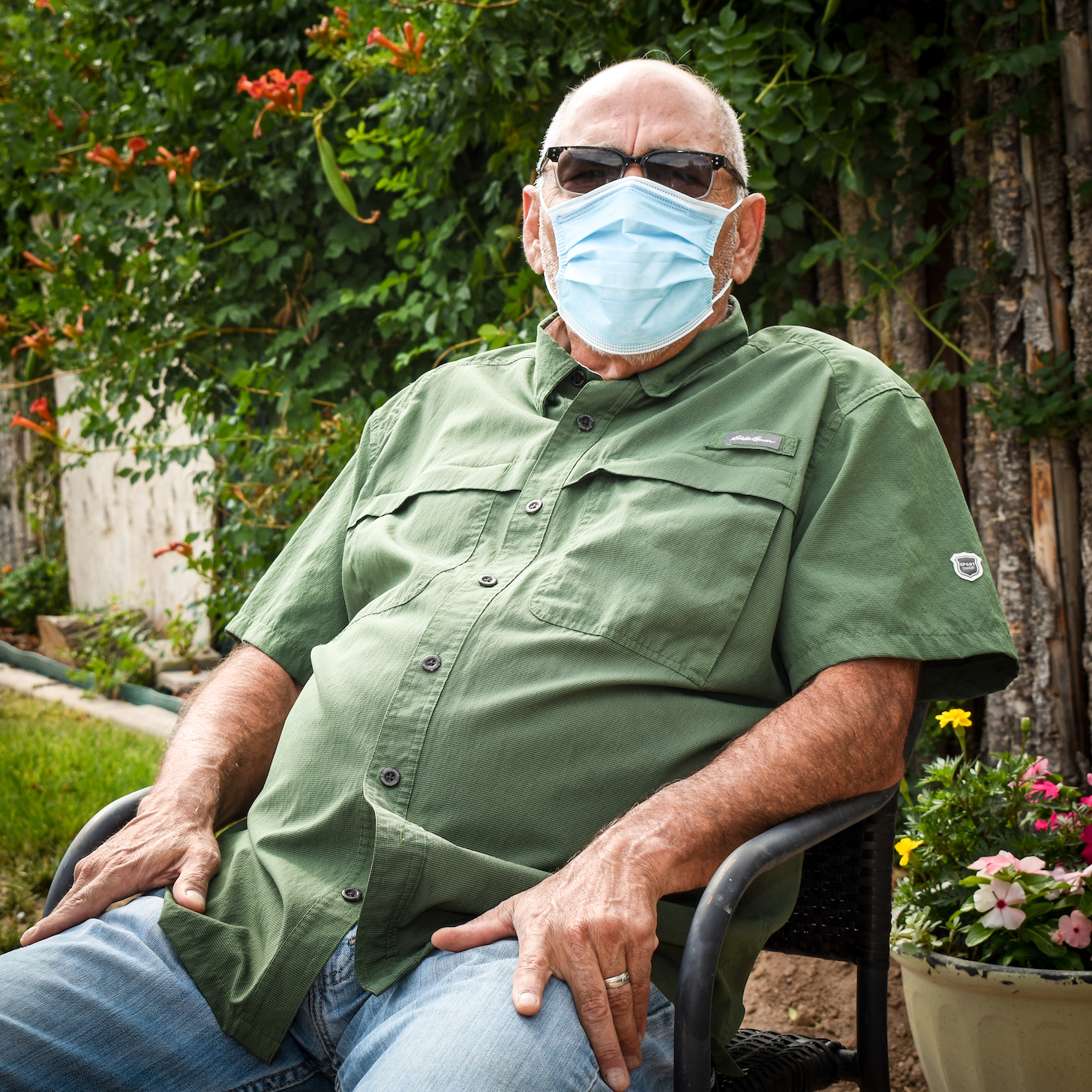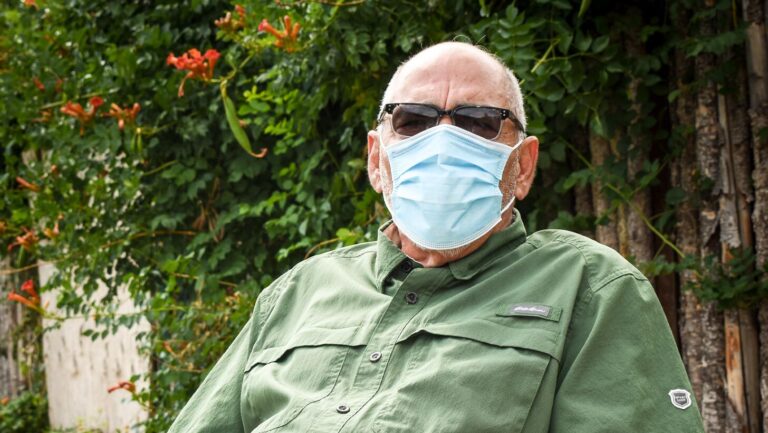New Mexico Blood
Santiago Baca is of Chicano and Apache lineage. He was thrust into instability the minute he was born in Santa Fe, New Mexico in 1952. Abandoned by his parents, he lived with his grandmother in the Estancia Valley until she took him to an orphanage. He ran away at 13 years old and took to the South Valley street life. Just as his adulthood dawned, he ended up in an Florence, Arizona prison for six years on drug-related charges. While navigating the harsh prison existence, including solitary confinement, he learned to control his temper and taught himself to read and write. His prison poetry became his fists; and when he was released, he harnessed the tools, got published by Mother Jones, and the rest is his unique history.Sixty Years On
Santiago Baca lives in Albuquerque with his wife and two teenagers. He has two older children as well. He has written 31 books of poems, essays and stories. He wrote the popular 1993 screenplay for the movie Blood In Blood Out aka Bound By Honor. He has mellowed with age, but he is still as passionate as he was when he was a younger man. He is committed to prison outreach through poetry, writing and education. He has created educational programs for school classrooms and leads writing workshops and retreats, encouraging writers of all levels to unleash their creative processes. His awards include the American Book Award, a Pushcart Prize, the Hispanic Heritage Award for Literature, the Cornelius P. Turner Award and the 2019 XII Encuentro de Escritores Award, along with many other national and international awards.His latest book, Laughing in the Light, was published earlier this year by Museum of New Mexico Press.Weekly Alibi: Tell us about your new collections of essays, Laughing in the Light. It follows Working in the Dark and is being widely acclaimed. And reviewers see a bit more reflective Santiago Baca. Would you agree?Jimmy Santiago Baca: I had fun writing it—it was a reprieve from the novel I had just finished and turned in to a publisher. LITL was an opening of the valves, a literary cleaning of the rusty pipes in my brain. I splurged insults against the illiterate thumb-sucking, orange-haired clown squatting in our DC OFFICE, railed against white supremacists and skinheads, scolded white liberals for gentrification while assuming Samaritan veneers, volley’d criminal condemnations against ICE for their NAZI practices, and at the end of a writing session, I rose from my desk with the biggest smile you ever saw. I discovered that when you write with no purpose other than truth-telling, it can be exhilarating and enthrall the spirit with reasons why you ever started writing—such a practice, where you point out certain obvious truths others have been silent about because it might hurt their careers or get them fired, infuses the spirit with a fluttering of light radiance that makes it difficult not to love. Your book A Place To Stand is weathering the test of time. What is it about your rhythmic telling of your life story that keeps resonating with new generations? It is not the experience of going to prison, because the fans of your writings cross all ages, religions and socio-cultural-economic boundaries?That’s a very good question. It’s a wonder, considering how it reaches so many and how it’s generated global responses from people suffering severe trauma the prison industry imposes on innocent people. It’s really a crime—the prison industry and the criminal justice system are so corrupt I struggle for a word to describe its rotten-to-the-core sickness. I suppose my book A Place To Stand has touched on something, something—an experience so horrid many never survive it. My book answers their suffering with embraces rather than accusations. The people are the victims and the system is the monster. And my book is an indictment against the education system too, seeing how I educated myself without their help or interference. The PBS-aired documentary film A Place to Stand also has student workbooks and a curriculum, Feeding the Roots of Self Expression, available for teachers. Tell us about this side of you, and why New Mexico teachers should include this in their discussion with students?Sadly, the books we choose for our students puts them to sleep at best and alienates them at worst, making them never want to be part of the schooling as we practice it today. Teachers are at the mercy of those councils and administrators who continue to choose books that never challenge our students. Oftentimes those at the top of our education system, especially here in New Mexico, are so cozied up to book distributors, they’ll savage and sacrifice the student’s welfare and future rather than risk their comfort zone and ballooning paychecks. New Mexico pretty much has been at the bottom of every other State in the Union when it comes to education—we’re really lousy, instead of fixing it, they hide behind closed doors and pretend nothing is wrong. It’s a shame. Those at the top should be fired, coddled miscreants, nepotists and cronyists—kicked out on their expensive trousers and skirts, they’ve done nothing to enhance and better our education here, just make it worse and worse every year. By the way, the APTS documentary was aired nationwide and viewed by millions, a great reception, which indicates Americans want solutions to our educational crises; also thanks must go to PBS and the wonderful director and producer, Gabe Baca and Daniel Glick.Let’s talk poetry. You have many rhythmic poem collections. Martín and Meditations on the South Valley is one of my favorites because of my family’s Hispanic South Valley roots. I know those people. Lately, my favorite is What is Broken is What God Blesses, and not because of any religious beliefs, but because of the stark hope it inspires for those broken. What is one of your own favorite poems? And did you hear poetry rambling around in your head as a child dealing with all the craziness?As an orphan, I was a pinto bean that grew in a patch of watermelons—in other words, different, you might call me nutty. Being so, I suppose I’m a sucker for all poetry, every new trek into a poem is for me an unrivaled adventure into the cosmos of my own spirit and that makes it special. The practice, not the final end, is what dazzles me. Playing with words is the art of merging with light, visiting new planets. After all these years, all 33 books of mine are still in print, and that is due to people like your readers finding something that touches them with love and gives them hope. We need it badly today. Prison work is a passion of yours. You go into facilities, meet with the prisoners on their level, coaxing them to use pencils over fists. Do they send you writings? What do you have upcoming in your prison outreach work, and how can citizens help?I carry a heavy correspondence with inmates across the country, many of them in high security lock-down status, which again, is criminal to treat these young men and women so cruelly. Our work continues on various levels. We have several programs now where we are working with inmates on the verge of release, we’re helping to write stories that will clarify their thinking on their future. We have the literacy program, the book give-away program, the internship and mentoring program—many more. If you would like to help with a small donation, go to my website jimmysantiagobaca.com and hit the donate button. We’re broke, we’re poor, but we keep on trucking, if we have to hitchhike to our location we do, if we have to steal books to give away to kids and adults who need, we do, if we have to let our utility bills go past, then we work in the dark. Nothing will stop us from helping people that I once was. You have four kids, two in their 30s, and two in their teens. How has your unique journey and powerful, raw writings shaped their lives?They think I’m a nut and they’re probably right. Plainly speaking, without the guidance and love and humor of my family, I’d been on the worm menu long ago.When you look out at the current political landscape that young brown males in particular have to deal with, what words of advice do you have?Gather into a support group, stop the drugs and violence, help each other and push, shove, hurl, throw, do anything you can to get our kids into school and graduated. We need doctors, activists, we need peace-makers, we’ve had enough of following the white racist version of screwing each other over to get ahead, time to offer a hand and time to accept each other as equal people. Get involved in helping to fight against ICE. Get involved. Contact us, we’ll help. Get involved. Get involved. Get involved, stop sitting there and watching Netflix until you’re blue-brained—get up, get out, get involved. If you wrote a short poem of advice to your 13 year-old-self, what would it say?That you’re enough, that you can stop trying to please others, that the greatest enemy that’ll harm you the worst is not white vigilantism, racism, we can deal with that kind subhuman madness, no, the worst is to believe that hard drugs can help you. Stay clean, educate yourself, reach out to others waiting in the flanks ready to help you, accept people by their heart’s intentions and behavior, believe in yourself, learn to accept being happy and break the chain of misery. On a tastier note, what is your favorite comfort food?Huevos rancheros, two eggs over-easy, lathered in green chile, homemade tortillas, bacon and hash browns and hot coffee—give me this, and I’ll scale Mount Everest in a day. What are your next book or movie projects?Have a new novel coming out in a few months, American Orphan. Working on Blood In/Blood Out 2, also a few other stories I’ve been wanting to write for 30 years, which I think I’ll actually get done this year. Is there a question would you like to be asked, that no one has asked?No, no questions, just a statement to those out there enduring this epidemic—stay cool, take the time to read a good book, realize our time is limited on this earth and do the best we can with what we have—that means getting to the voting booth or mail in your vote and ridding this beautiful country of the traitor in office. It means take walks, hike, bicycle, start a journal, learn to play piano, help teachers in any way you can, be kind to Chicanos. Given half a chance, you’ll find we are the most beautiful and kindest people on the earth.Tearjerker Disclaimer: My oldest son, James Ryan, and I shared Santiago Baca’s book A Place to Stand while James Ryan was finishing up his prison sentence for substance abuse-related charges. I listened to it, he read it. We laughed, cried, we argued, and much of it was and is, for me, a painful yet oddly beautiful book. Santiago Baca has childhood roots in the Estancia Valley, as did James Ryan. Santiago Baca dove into the drug underworld and also served prison time. Yet through words, he found his ground. James Ryan never found his place to stand as he died of an overdose 80 days after being released from that prison sentence.











